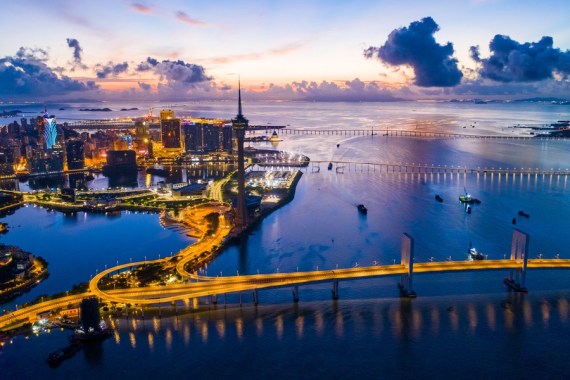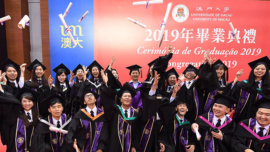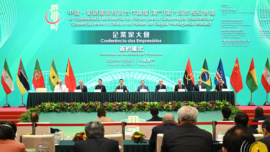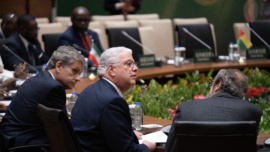In December last year we published the list of the 20 most influential people in Macau.
And we realized that they were almost all men.
MB August 2020 Special Report | 20 (+20) influential women
Two immediate conclusions: Macau is still a male-dominated society, although more women are taking up positions (just look at the recent appointments made by the current Chief Executive) and we needed to make a women-only list.
This is what we present in this issue of Macau Business.
Now, as before, we say this is a seemingly impossible task, since there are virtually no entirely objective criteria for choosing the names and as any list, under these conditions, our endeavour is bound to be challenged.
Now, as in the past, we realize and accept this shortcoming.
But it is more important to go ahead with it.
And the truth is that, with this list, we highlight not only the three that were on last year’s list, but another 17 women who equally stand out in Macau’s life.
And, as in the 2019 list, we add 20 more, who, despite not being arguably as influential as the top 20, are also movers and shakers.
* “The Future is Feminist” is the name of a book edited by Mallory Farrugia (2019)
Co-ordinated by João Paulo Meneses

Agnes Lam – The Centrist
Back in 2017, Agnes Lam made headlines by garnering about 9500 votes and securing a seat in the Legislative Assembly for the first time, after two previous failed attempts.
One of the interesting outcomes to keep a close eye on regarding next year’s parliamentary elections is related to Lam’s room to maintain her position or to expand it.
This will depend on the city’s employment of a rather uniquely adjusted D’Hondt method to allocate seats, which favours the unfolding of lists to increase the chances of getting more seats, as well as on the voters’ view of Lam’s work as a legislator.
During her term, and since she took office, Agnes Lam positioned herself a a third way legislator, a centrist.
On the one hand, Agnes Lam tends not to side with more with some more “politically sensitive” proposals from the legislature’s “pro-democracy” wing.
On the other hand, she is committed to maintaining her own agenda, with a strong focus on women’s rights, environmental policies, social welfare, urban planning and culture, independent of the traditional sectors more aligned with the ruling power.
In addition to parliamentary work, Agnes Lam is a highly respected voice in various social and scholar circles in Macau; she not only is an Associate Professor at the Department of Communication (yes, she keeps being linked to University), but she is also the Assistant Dean of the Faculty of Social Sciences – one of the few women, with one of the highest positions in the entire University of Macau. Agnes Lam is also the Director of the Centre for Macau Studies, “established for 20 years to meet the economic needs of and bring social development to Macau.”
Furthermore, Agnes Lam’s academic study, “The Beginning of the Modern Chinese Press History – Macao Press History 1557-1840”, recently won the 1st prize in the Macau Humanities and Social Sciences Monograph category.
That’s why, inside and outside the Legislative Assembly, as a journalist or as a writer, Agnes Lam will continue to be a prominent voice.

Alice Kok – The Artist
Artist, President of the Art for All Society, Executive Director of the Script Road Festival, professor at several universities, and collaborator of some local journalistic publications.
This brief introduction would probably be enough to justify the presence of Alice Kok on this list, but it would be clearly insufficient to sum up the reasons that led us to feature her as the only artist.
Over the past two decades, Alice Kok has earned the respect and appreciation from the local artistic community, with a diverse portfolio spanning video, photography, writing, drawing, and installation. She has been the president of the Art for All Society since 2014, unanimously elected by the other members.
In addition to her individual works, which she has shown her artwork at various exhibitions in Macau, as well as at film festivals in Hong Kong, Alice Kok is also a curator, and one of the most sought-after.
It is difficult to say whether Ms Kok has already reached the peak at the age of 42, because there will always be new artistic challenges to face; but all of this is more revealing if we add that Alice Kok remains a free, and even challenging, spirit no matter who is in power.
Her activism towards Tibet, in support of the refugees who are prevented from returning to Lhasa, may not exactly earn her sympathy from Beijing, or at No. 603 of Avenida do Dr. Rodrigo Rodrigues (Liaison Office).
Alice Kok was born in 1978 in Macau, where she studied at the Polytechnic Institute before traveling to France, much under the influence of her mentor, Frank Lei, in 1998.
She spent several years in Europe, without thinking of returning.
Then, she travelled to Tibet in 2006, to volunteer and deepen her knowledge on the theme of her Master’s thesis, related to colonialism, as well as to connect with Buddhism.
It is from this experience that what is probably her best-known work, the film “Yet in Exile – Family Script”, was born. Completed after that trip, it was later selected as one of the ten finalists at the 2009 Hong Kong Independent Film and Video Awards.
“When I left Macau, I had the perception that I am from Macau. All my life, I always took Macau for granted. But when you are outside your country, your birthplace, you start to have questions about who you are, what it is that makes something special. And Macau is a special place”, Alice Kok said in an interview with Ponto Final newspaper.

Angela Leong – The Stakeholder
Is the reader one of those people who leave the most difficult jobs to the last minute? So are we! That’s why Angela Leong On Kei’s profile was the last to be written …
There is much that can be said about Angela, starting with the fact that she could be the only person capable of rivalling Pansy Ho for the leadership of the businesses inherited from Stanley Ho in the next decade.
Pansy’s alliance with the Henry Fok Foundation sidelined Angela Leong. But, at least for now, she seems satisfied with the position of co-chairman that resulted from the 2019 agreement, as she remains one of the main SJM shareholders (around 12 per cent).
But Angela Leong’s business interests are far from being exhausted with the management of SJM. She is a major shareholder of the only theme park under construction in Macau at this time, Lisboeta, which will cover 141,000 square meters in Cotai and is being built for HK $5 billion.
Moreover, while managing SJM, Ms Leong also has several businesses as a ‘client’ of the concessionaire, as she is in charge of several satellite casinos (L’Arc and Oceanus / Jai Alai).
This diversification of business interests would be enough to catapult Angela Leong to a very high position in Macau. She has an estimated net worth of US $4.1 billion, and she made it onto Forbes’ Hong Kong’s Richest list in 2019.
But she has another characteristic that is absolutely unusual in MSAR: she is also a member of the Legislative Assembly, a place she has occupied continuously since 2005.
Ms Leong is not one of the most active parliamentarians, but this was not her objective: she has been the voice of the gambling interests in the Assembly.
Who could have anticipated that then 26-year old dance teacher whom Stanley Ho met in 1986, and who would become his fourth spouse and later giving him five children, would end up having this leading role?
However, some guarantee that, at 60 years of age, her top priority now is the future of her children. Arnaldo Ho was the first to take centre stage.

Elsie Ao Ieong – The Madam Secretary
Let us be clear: Elsie Ao Ieong would not have been part of the list of the 20 most influential women in Macau, had it been published a year ago.
The same is to say that Ms Ao Ieong is on this list because she was chosen to be the Secretary for Social Affairs and Culture, and because she is the only woman in this Executive. In addition, she is the only woman appointed by Ho Iat Seng for his cabinet (team of policy secretaries), as well as the only woman among all high-ranking officials and members of the Chief Executive’s top advisory body (Executive Council). As a result, she is the woman with the most executive power in the MSAR.
However, it would be a serious mistake to presume that Elsie Ao Ieong was parachuted to Macau in December of last year.
On the contrary, she has lived here since the early 1990s and, despite having been born in Guangdong and having lived in mainland China as a young woman, she has already had the opportunity to say that “Macau is my home.”
Still, in the eyes of many observers, it was a complete surprise when the newly elected Chief Executive announced her name as a successor to Alexis Tam.
Firstly, because Ms Ao Ieong was previously regarded an efficient drather low-key bureaucrat, even though she had already reached the top ranks of the Identification Services Bureau (DSI). Secondly, with her undergraduate degree in Engineering, computer variant, and a master’s degree in Computer Engineering, only a few would guess that, even with another postgraduate degree in Comparative Law, she would end up at the helm of the Secretariat for Social Affairs and Culture.
So what did the Chief Executive see in Elsie Ao Ieong? Dedication and competence, he guarantees. In fact, Ho Iat Seng apparently used the example of the Identification Services Bureau as a model of organization and good service in several conversations he had while preparing his program and team.
It is uncertain whether the Chief Executive had a personal relationship with Elsie Ao Ieong before choosing her for the job. Perhaps he might have asked his sister Tina Ho for some information. Tina and Elsie collaborated within the Macau Female Civil Servant Association, where the new Secretary served as vice president until last year.
“I know that this position entails a great responsibility. It is the greatest challenge in my 25 years serving the Administration”, the Secretary for Social Affairs and Culture commented.

Fanny Vong – The Educator
Universities have been historically among the first places where women, often mainly as teachers, took power.
This, however, did not happen in Macau, with the exception of the Macao Institute for Tourism Studies (IFTM), which is a school where women actually rule.
Fanny Vong therefore deserves to be highlighted for her contribution to the city’s tourism city’s tourism training and studies as an educator and researcher and also because she has been at the helm of IFTM since 2001.
A Macau native, Vong has both a bachelor’s and a master’s degree in Business Administration from the University of Macau.
She became a lecturer at the public university, before joining IFTM as vice director of the Tourism College in 1999.
To enrich her curriculum and diversify her knowledge, she did the doctoral research at both Stockholm University, and at Instituto Superior de Ciências do Trabalho e da Empresa in Portugal, and was awarded a PhD degree in Business Organisation and Management by the latter.
IFTM’s leadership and associated responsibilities (she is part of the Macau SAR government’s Tourism Development Committee, the Cultural Industry Committee, the Talent Development Committee, and the Guangdong-Macau Development Strategies Group, among others) have not diminished her interest in continuing to research for topics related to hospitality practitioners, the relations between cultural tourism and gaming destinations, or corporate and social performance. But this is just a little sample of her accomplishments, as she has published over 50 research papers and publications on tourism development and other topics.
Her last project is the introduction of the first postgraduate programmes to be offered by IFTM, leading to postgraduate diplomas, Masters, and PhD degrees. The first postgraduate programmes were offered during the academic year 2019/20.
In 2017, IFTM became the world’s first higher education institution to pass the International Quality Review from UK’s Quality Assurance Agency for Higher Education. In 2020’s QS World University Rankings by Subject, IFTM takes the first place among universities in Macau, and the second place in Asia.
























